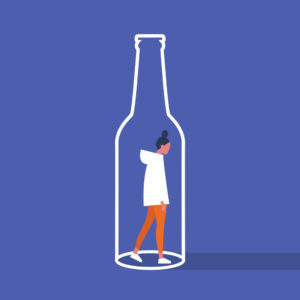If a heavy drinker chooses to suddenly stop drinking, or experiences a break in the consumption cycle, alcohol withdrawal symptoms can develop as a response. Whilst mild for some, withdrawal symptoms can be chronic, normally indicating a serious dependency on alcohol.
Through heavy drinking habits, both the body and brain will become accustomed to the intake of alcohol. Alcohol is a central nervous system depressant, which leaves its mark by slowing down internal systems and responses. Over the course of consistent and heavy alcohol consumption, physical and psychological adaptations will take place, to accept alcohol and its effects.
Get FREE Confidential Advice Regarding Alcohol Addiction Therapies
Speak to us for FREE and confidential advice regarding an alcohol problem, whether it is you or a family member/friend. You are not alone.
GET IN TOUCH TODAYAlcohol withdrawal symptoms present themselves as a form of shock. Once quantities of alcohol have intentionally or unintentionally dropped, the body and brain can act out, which is diagnosed as alcohol withdrawal syndrome.
Symptoms can be life-threatening and can motivate many people to relapse. Whilst symptoms can also be mild and manageable, the withdrawal process is heavily unpredictable.
Being aware of alcohol withdrawal symptoms, their effects and their treatability is encouraged if you or someone you care about is dependent on alcohol. Here’s some insight into the symptoms of alcohol withdrawal, along with how to control them through alcohol detox and rehabilitation here at Action Rehab.
What is Alcohol Withdrawal?
Alcohol withdrawal is the process that the body and brain go through as a response to alcohol leaving the internal system. Whether that’s through an attempt to stop drinking or to reduce intake, the withdrawal process is recognised as a form of shock.
Especially expected for people with frequent and heavy drinking habits, the body and brain will become accustomed to a strong level of alcohol in the bloodstream. The effects that alcohol has on the central nervous system, by relaxing and slowing down internal systems can also be addictive. Once alcohol begins to leave the bloodstream, and its suppressing effects start to wear off, withdrawal is an expected response.
Symptoms are one of the first signs of alcohol withdrawal syndrome, which strongly indicates that an alcohol use disorder or problem is present. Someone who’s suffering from an alcohol addiction, yet suddenly stops drinking will be at high risk of experiencing such symptoms.
Alcohol withdrawal symptoms can be both mild and life-threatening, can display through physical and psychological forms, and can continue for the long-term if untreated. Due to their unpredictable nature, even people who are merely abusing alcohol, rather than fuelling an addiction can encounter such withdrawal symptoms.
To reduce the risks and dangers of alcohol withdrawal symptoms, a medically assisted detoxification should instead be worked through, available by itself or as a part of a full rehabilitation programme.
Alcohol Withdrawal Symptoms

Symptoms can display as soon as alcohol leaves the internal system and can continue to worsen as time goes on. Withdrawal can impact both the body and mind, resulting in unpleasant symptoms for some people.
Alcohol withdrawal symptoms are mostly a concern for people with drinking problems. Yet they can also be experienced by individuals with unhealthy, binge-like habits.
Symptoms can range from mild cases of vomiting and hangover-like side effects to dangerous bouts of delirium tremens. Delirium tremens indicate a rapid change in the cognitive and nervous systems, influencing symptoms such as seizures, hallucinations, impaired vision, and agitation. Symptoms can be life-limiting through sudden and unmanaged withdrawal.
A number of internal factors can dictate the strength of withdrawal symptoms, including gender, age, wellbeing, alcohol intake, and the severity of an alcohol problem. Below are some of the most common symptoms, displayed throughout the withdrawal timeline.
Physical Withdrawal Symptoms
- Fatigue
- Headaches and migraines
- Vomiting, nausea and digestive problems
- The shakes
- High body temperature
- Excessive sweating
- Increased heart rate
- Delirium tremens
Psychological Withdrawal Symptoms
- Chronic depression
- Insomnia
- Alcohol cravings
- Anxiety and panic
- Mood swings
- Irritability and confusion
- Paranoia
- Confusion
How Long Do Alcohol Withdrawal Symptoms Last?
Alcohol withdrawal symptoms can begin just a few hours post-consumption. Symptoms are commonly mild at this point, as traces of alcohol will still be present within the bloodstream. The longer that alcohol has been withdrawn from, the stronger that symptoms can become.
If treated, withdrawal symptoms will usually last for 1-2 weeks. After the first week, symptoms are found to suppress as the body stabilises. If untreated, symptoms can prolong for weeks, slowing down the addiction recovery process.
For people who experience chronic withdrawal, such as delirium tremens, symptoms can last longer and can also result in co-existing conditions. This is especially common whilst considering mental health issues and their co-occurring development alongside alcoholism.
How to Treat Alcohol Withdrawal Symptoms?
Treating alcohol withdrawal is possible, by completing the detachment process through alcohol rehab. Safe withdrawal can be achieved by working through a medically assisted detoxification process. With medical assistance, 24/7 observations will be made, along with the use of alcohol withdrawal medications. The likes of Naltrexone can be used to block the positive effects of alcohol on the body and brain, along with the prescription of Acamprosate, to restore and stabilise the brain.
Post-detox, additional treatments will be essential in order to prevent relapse and to support those who are dependent on alcohol. Via inpatient rehab for alcohol addiction, various therapies for alcoholism can be worked through. Individual, group and holistic therapies are recommended, to work through the psychological and emotional symptoms of withdrawal.
As withdrawal symptoms can continue for a number of months, long-term recovery plans and relapse prevention techniques will be promoted. Treating alcohol withdrawal will focus on immediate wellbeing yet will also support long-term sobriety.
Complications of Alcohol Abuse

Alcohol abuse can be extremely dangerous, beyond the expected withdrawal symptoms. Abusing alcohol can result in many life-limiting conditions and symptoms, attacking the vital organs and systems.
A dual diagnosis of mental health issues is a common complication of alcohol abuse. Clinical depression, anxiety, personality disorders and bipolar can all develop alongside addiction, or can worsen where a pre-existing diagnosis is made.
Drinking heavily can also result in liver damage and disease, high risks of cancer, digestive problems, infertility, strokes, heart disease, and a compromised immune system. Ill-health, a reduced quality of life, and many further personal consequences can amount through alcohol abuse, including the risk of alcohol withdrawal syndrome. To prevent such complications, professional support and treatment should be sourced as soon as possible.
Can You Prevent Alcohol Withdrawal Symptoms?
If alcohol addiction recovery is your goal, withdrawal symptoms can be prevented by completing a detox process. The process will be medically observed and will be controlled, helping to reduce such risks.
If you’re intending on reducing your alcohol consumption, tackling the process through a slow and moderate approach is recommended. An instant change can trigger withdrawal symptoms, which will then require medical intervention.
Alcohol withdrawal symptoms can impact many different people, in many different ways. With professional input, a reassuring withdrawal process can instead be worked through, to prevent or reduce symptoms.
How We Can Help You
At Action Rehab, we can help you by offering advice, support, and recovery recommendations. Through our network of leading alcohol rehab clinics, we can refer you to a suitable centre, ready for a detoxification process.
By reaching out, you can find and experience medical assistance and care whilst working through alcohol withdrawal symptoms and rehabilitation efforts.
Contact our team if you are struggling with an alcohol addiction.







 Call Us
Call Us Contact Us
Contact Us